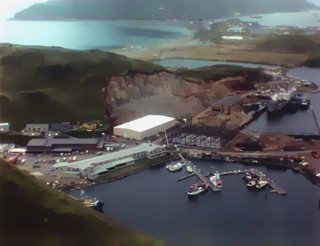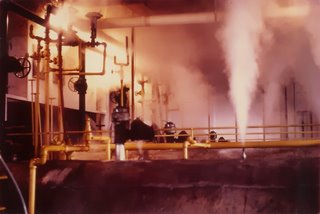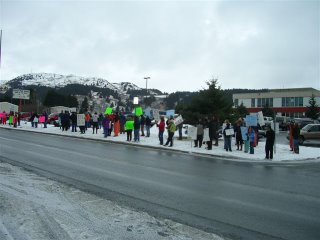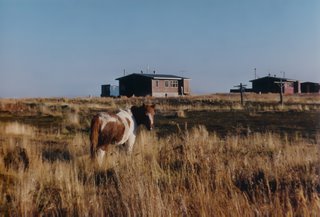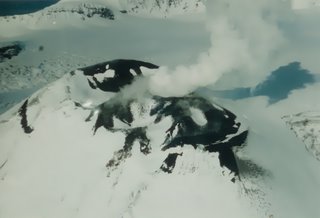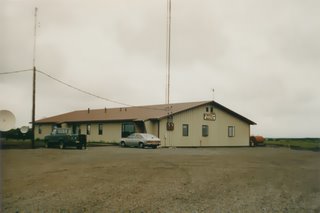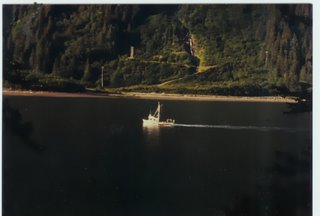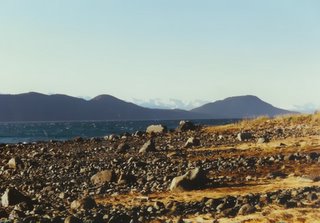Bundrant says Trident is "small potatoes"?

Refering to his take-over of another major Alaska seafood processor, Chuck Bundrant, Chairman and founder of Trident Seafoods, says he'll just be "small potatoes" compared to Japanese processing interests.
Trident's bow is running over other companies at a faster rate now.
This says one thing right off. That in the processors' scramble to gain secured ownership of fish resources to perpetuity for themselves, they are effecting a major give-away of U.S. citizen's renewable resources to foreign interests. And these foreign interests outweigh domestic interests by virtue of their ownership of more steel and concrete planted around Alaska. I'm sure they are pleased. Helping? Why not?
As crab "rationalization" has shown, this kind of give-away ends up shrinking the fleet to a small fraction of it's former glory. And that shrinks a lot of other things in turn. But a couple of processors who were able to influence the system got what they were after. You wouldn't believe the number of people who are willing to promote these processors' agenda and get themselves on every committee imaginable. So it ends up looking like a kind of solidarity, except it's the antithesis of fishermen and community health.
What gets me is when reporters unknowingly go along with what they think is solidarity, and out of naiveness, promote this undermining of the model of fishing community success. An otherwise noted reporter, who I usually enjoy reading, fell into this trap over the Trident announcement. He called Chuck Bundrant who, of course, said the merger would be the best thing since peanut butter. (I commented earlier on news that as early as 2001 or 2002, processors were saying they wanted plants for their production record. Doesn't that now seem obvious, given what happened in Dutch Harbor.)
Then this reporter called the "Godfather of the fishing industry," as he called him, who said "I like it." Where was he when my great-grandfather and grandfather began pioneering Alaska fisheries in 1901. And who also assisted in Adak dirty dealing recently.
Then he called a miners' lobbyist, who just now happens to be employed as the Commissioner of DCCED, who said "I don't see anything wrong with it." Well, why would he, I don't understand the mining industry either. And he's charged with preserving communities? (the second "C') Amazing!
The last "usual suspect" he called was the head of the self-proclaimed "largest fisherman's trade association in the State." The guy owns a huge chunk of stock in another major fish processor that his father is chairman of, and has always been a Seattlite, along with his crowd that keeps him in this position. What do you think he's going to say about a fellow conspirator? Now, conspiring to take all the money for yourself is what we find admirable in entrepreneurs, right? Even machine-gunning striking coal miners like Rockefeller did?
If you're thinking this merger might not be so hot now, hang on a sec., there's more. Mr. Bundrant says there will be lots of competition after the merger. Only one other competitor in Southeast Alaska. The little processors aren't competition. Trident will have three of the four plants in Petersburg, where the other competitor in the whole of S.E. is located.
Read what a reader sent that sheds a little light on what fishermen can probably expect even more of: "A local processor told me about attending a processors meeting in Anchorage where Chuck B. skipped out on lunch. When asked where he was during lunch C.B. explained that there was a cod fisherman in Sandpoint flying his fish out to Anchorage, so Chuck found out who was buying it and offered him all he could use at a lower price, "just don't buy any more fish direct from the fisherman." With all the "free-@#$%&*-money" Trident has been gifted via AFA and crab ratz they can afford to lose money squashing the little guys."
And another reader sent this: "Trident has inshore cooperative permits for pollok #101 and #102. This was a gift from Ted in 1999-American Fisheries Act(AFA). 101& 102 =33.723% of Bering Sea Inshore. 2003 yielded 282,334 metric tons for Trident.
People lease pollock "in the water" for $400 per ton. If Trident just leased this out it would be over $100,000,000 a year. forever. That's just live fish in the water."
That Darth Vader economist, Scott Matulich, testified to Congress on Feb. 13, 2006 to promote ratz:
"more remarkable because the gross value of the halibut fishery nearly doubled DUE to the IFQ policy."
"Introduction of IFQs liberated the market"allowing season to elongate eight months"
"59% of fish is now sold in higher-value,fresh market."
"average wholesale price of halibut increased 66%,while catch increased 19%"
"IFQs encouraged entry of both primary processors and broker's.These new entrants tend to be INNOVATIVE, LOW COST{efficient]firms that have operational advantage"
"Fifty-one new firms became buyers of halibut"
This is simply proof that Individual Fishing Quotas for fishermen is best for all concerned. It isn't justification for any other management scheme through calling IFQs "rationalization" and then calling the new processor privileges "rationalization" too. See what's going on?
And we sure don't need reporters glamorizing such activity by calling Chuck "flinty," like reporters labeled the killers and the robbers of the wild west days. What evidence is there that he will share his success with fishermen and communities instead of buying another jet or company? Well, you be the judge, and if you want to call the FTC but are hesitant, remember, "He who hesitates is lost."
